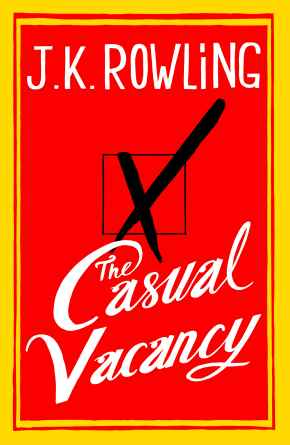Print Edition: October 10, 2012
 The Casual Vacancy begins with death. It continues with Dursley-like muggles—Rowling is so good at the portraying the narrow-minded—gossiping and gloating, as we are introduced into the world of British small-town politics.
The Casual Vacancy begins with death. It continues with Dursley-like muggles—Rowling is so good at the portraying the narrow-minded—gossiping and gloating, as we are introduced into the world of British small-town politics.
The death of Barry Fairbrother leaves an empty seat in the Parish council of Pagford (a cobble-stone street village) and silence in the wake of a strong voice of advocacy for the unprivileged. We trail along an interconnected web of relationships as various townspeople try to fill the vacancy and push their own agenda through.
Rowling jumps from person to person, and it was my pleasure to follow. Characters are undeniably Rowling’s strongpoint. We follow an acne-riddled but sympathetic teenager with a hard-on for the worldly new girl in town, her social worker mother who’s aiding a drug-addled woman whose daughter goes to the same high school as the acne-riddled fellow … because everyone knows everyone somehow.
It’s a story of binaries. Opposites struggle with one another; wife and husband, rich and poor, child and adult. It’s a clash of racism, sexism and classism as Rowling delves into complex adult issues. She simplifies until the themes are obvious, with the excuse of having an isolated small town for the story to play out in.
Several of Rowling’s petty, cruel characters are given the same sort of dynamics as Petunia Dursley: a sort of twist, an undeniable motive. It does not reach the point of being as powerful as Snape’s depth, and sometimes they just fall flat with nothing but bigotry and pride to hold as their motives, which works, but is not as strong. The creativity and humour is still present, injected into each scene with a cleverness that belongs only to Rowling.
This can’t be considered a children’s novel – not at any point. Rowling deals with death, sex, infidelity, self-harming, rape and drugs. The Harry Potter series did, in its way, deal with some of these topics – especially death and racism. But the hardness in which Rowling writes about it is very different. She doesn’t shy away from lust, swearing, the raw, rough language and realities as she does (out of necessity) in the Harry Potter series.
The Casual Vacancy isn’t anything special. Though Rowling’s writing technique still maintains that humour, that ease of dialogue and characterisation, the plot lacks a cheerfulness that Harry Potter had. It meanders along in melancholy, never quite brightening up. The characters are good, but Rowling doesn’t have seven books to develop them, and they don’t live up to Harry Potter. It’s the real world now; there’s no magic to bring the text to life.
But what did we expect to say? Anything Rowling would have written at this point would have ended up this way – a bit of a letdown. But Harry Potter fans, read it. Just to hear Rowling’s voice again. You won’t be disappointed for what it is.


